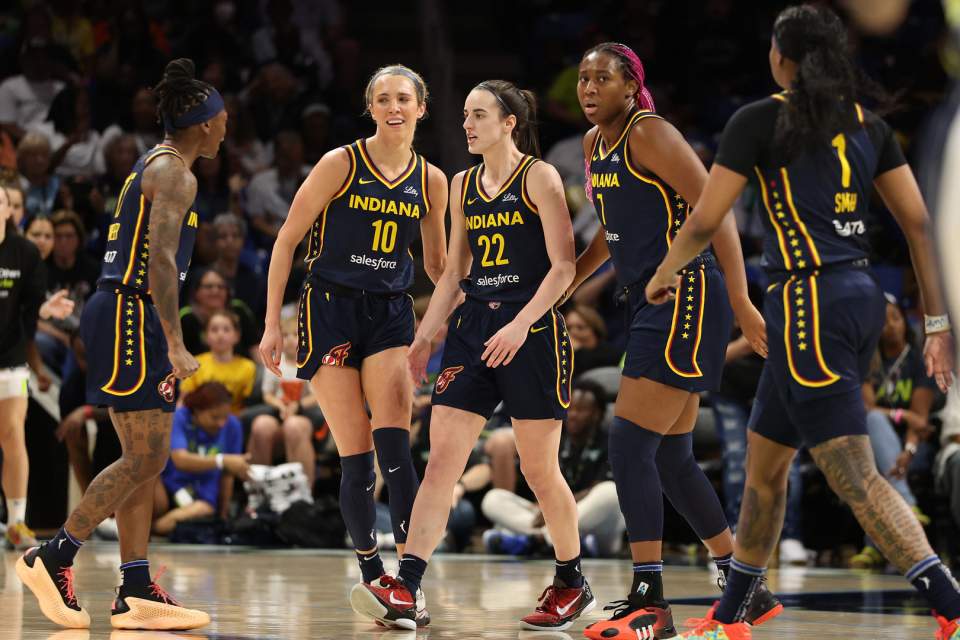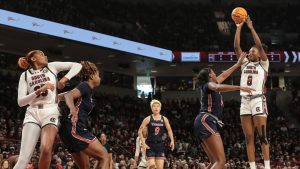
The WNBA star Caitlin Clark sparks debate by drawing comparisons to Luka Doncic.
Caitlin Clark, a rising star in the Women’s National Basketball Association (WNBA), has garnered widespread attention for her exceptional skills on the basketball court. Her playing style and ability to make an impact in virtually every aspect of the game have led many to compare her to NBA stars, most notably Luka Dončić. These comparisons, however, have sparked a debate regarding the ways in which we analyze and appreciate basketball players across gender lines, as well as the broader context of what such comparisons really mean.
Caitlin Clark’s Rise to Prominence
Caitlin Clark’s journey to stardom has been marked by a series of achievements that have made her one of the most talked-about players in women’s basketball. Her dominance in college basketball, particularly with the Iowa Hawkeyes, has been nothing short of extraordinary. Clark’s playmaking ability, scoring prowess, and leadership on the floor have drawn comparisons to some of the best players in the game.
A standout feature of her game is her deep three-point shooting range, which rivals some of the best in the men’s game, including the likes of Steph Curry. Her vision and passing skills, too, reflect a high basketball IQ, making her a dual-threat as both a scorer and a creator for her teammates. Additionally, Clark’s fearless and confident demeanor on the court has drawn attention from both fans and analysts, further elevating her profile.
Luka Dončić: The NBA Sensation
Luka Dončić, a Slovenian guard for the Dallas Mavericks, is one of the brightest young stars in the NBA. Since entering the league in 2018, Dončić has quickly become one of the most exciting and effective players in the NBA, garnering comparisons to some of the league’s all-time greats. Like Clark, Dončić has a rare combination of skill, vision, and basketball IQ that allows him to dominate in various ways.
Dončić’s game is built around his ability to score, rebound, and facilitate for teammates. His step-back three-pointer, incredible court vision, and knack for clutch performances have made him a fan favorite. Much like Clark, Dončić has a unique style that allows him to thrive in multiple facets of the game, whether he’s hitting deep threes, driving to the basket, or creating opportunities for others. His versatility and all-around game have made him a frequent subject of debates regarding his place among the league’s elite.
The Comparison: What Sparks the Debate?
The comparisons between Caitlin Clark and Luka Dončić have sparked significant debate, both in terms of basketball analysis and the broader discussion of gender equality in sports. At the heart of the comparison is the recognition that both Clark and Dončić play a similar style of basketball—highly skilled, versatile, and with an ability to control the game from multiple areas of the court.
However, it’s important to note the context of these comparisons. First, while Dončić competes in the NBA, the premier men’s basketball league in the world, Clark plays in the WNBA, a league with a distinct set of challenges, a different pace, and a different level of athleticism. Some argue that comparing the two players is flawed, as it fails to take into account the vast differences in physicality and competition level between men’s and women’s basketball.
Yet, many argue that Clark’s playstyle transcends gender. Her incredible skill set is comparable to that of some of the best male players, including Dončić. The issue, however, lies in how people interpret such comparisons. Are we comparing them purely on their style of play, or are we inadvertently placing women’s basketball in a box where it’s only valid when compared to the men’s game?
The Impact of Gender in Sports Comparisons
The debate over comparisons between Caitlin Clark and Luka Dončić cannot be separated from the larger conversation about gender in sports. The question arises: why do we feel the need to compare a female athlete to a male counterpart to validate her greatness? When Clark’s skills are likened to Dončić’s, it brings attention to the ways that women’s sports are still often measured against the standards of men’s sports, even when the contexts are completely different.
On one hand, comparing Clark to Dončić acknowledges the exceptional nature of her skills and emphasizes that she can hold her own in a conversation about the world’s best players, regardless of gender. On the other hand, this comparison can inadvertently diminish the distinctiveness of women’s basketball by implying that its value only exists in relation to men’s basketball.
Caitlin Clark is already a superstar in her own right. Her accomplishments in the NCAA and WNBA are impressive without needing to be compared to a male counterpart. By drawing these comparisons, we risk downplaying the importance of the women’s game and reinforcing outdated ideas about how women’s athletics are positioned within the broader sports landscape.
Skill Sets and Playing Style: A Closer Look at the Comparison
While the gender dynamics at play are critical to understanding the debate, it’s also essential to delve into the actual basketball similarities between Caitlin Clark and Luka Dončić. Both players are known for their exceptional court vision and passing, often making plays that leave fans and analysts in awe. They can both score in a variety of ways, from deep three-pointers to crafty finishes in the paint, and they exhibit a high level of basketball intelligence.
One of the most striking similarities between Clark and Dončić is their ability to control the tempo of a game. Both players have an uncanny knack for slowing down the game when needed, allowing them to survey the court and make the best decision. Whether it’s a step-back three-pointer or a pinpoint pass to a teammate, they both excel at making the right play at the right time.
However, there are some notable differences in their games as well. Dončić is a physically imposing figure, standing at 6’7” and weighing 230 pounds. His size and strength allow him to dominate physically, especially when driving to the basket or battling for rebounds. Clark, on the other hand, is a more traditional guard standing at 6’0”, which still makes her a tall player for women’s basketball, but her physicality does not compare to Dončić’s.
Despite this difference in size and athleticism, Clark makes up for it with her sharp basketball IQ, fluidity, and scoring ability. She uses her speed and agility to create space for herself, often making defenders look foolish with her quick crossovers and deadly shooting. While Dončić uses his strength and size to power through defenders, Clark relies on finesse and skill, making her unique in her own right.
The Larger Conversation: How Can We Elevate Women’s Sports?
Ultimately, the debate over comparing Caitlin Clark to Luka Dončić serves as a reflection of the larger issue facing women’s sports: how can we elevate them to the same level of respect and recognition as their male counterparts? When we talk about Clark in the same breath as Dončić, it’s not because she’s a female player trying to prove herself by comparison, but because she’s one of the most talented and dominant players in the game today.
Instead of comparing women’s players to men’s players, perhaps the goal should be to elevate women’s sports to their rightful place in the conversation about basketball greatness. Players like Caitlin Clark are more than capable of carving out their own legacy without constantly being measured against their male counterparts. To do so, we need to stop viewing women’s basketball as something that exists in the shadow of men’s basketball and start recognizing it as an equally exciting and dynamic product in its own right.
A New Era of Basketball Recognition
The debate over whether Caitlin Clark and Luka Dončić are comparable is complex and layered. On one hand, the comparison reflects the immense talent of Clark and acknowledges that she has the ability to control a game in a way that rivals some of the best in the men’s game. On the other hand, it raises important questions about gender and the need to validate women’s achievements through comparisons to male players.
As the discussion continues to unfold, one thing is clear: Caitlin Clark is a force to be reckoned with, and her impact on the game of basketball cannot be denied. Whether compared to Dončić or not, she is forging her own path as a basketball superstar, one that will inspire future generations of players to come.
The conversation should not stop at comparison. It should focus on elevating women’s sports, supporting female athletes, and recognizing the unique and incredible contributions they make to the world of basketball.





